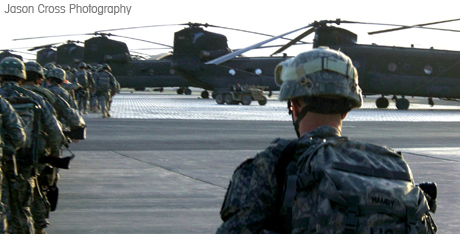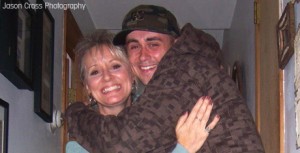It has been more than three years since the death of my son. I have recovered from the shock, the months when disbelief muddled reality, when nightmares of his voice calling “Mom” drew me out of sweat-drenched sheets. I have crossed back over a border of sorts, returning from some distant place. I can feel true happiness again, an emotion I was sure would forever elude me. And even on the rare days when I hear the resonance of his laughter and smell the air of his childhood over my shoulder, panic no longer seizes my stomach.
My return was not an automatic process. For me, the journey to health and forgiveness was a choice.
Jason died jumping from the bunker to kill a sniper who was picking them off from a mosque above.
For many months, I felt my anger was justified and wrapped it around my shoulders for comfort like a Shetland blanket. I believed that the United States Army had squandered my son’s bravery and his life. Jason had been part of the small elite paratrooper platoon Chosen Company. On July 9, 2008, they were sent into the remote village of Wanat in the harsh Waygal Valley of Afghanistan over the protests of Intelligence officers warning that hundreds of Taliban were waiting in ambush. They arrived with inadequate supplies, no air support and no cover. On the third morning, at 4:20 a.m., the Taliban attacked.
Jason and eight of his comrades were stationed in the Observation Post above the main defensive position. They fought like heroes to hold this strategic site, preventing the main base from being overrun and saving the lives of the rest of the platoon. Jason died jumping from the bunker to kill a sniper who was picking them off from a mosque above. A Taliban bullet entered his neck and traveled down his chest. When air support arrived an hour later, nine of the 49 soldiers were dead and 27 wounded. Eight had died defending the Observation Post.
The battle of Wanat has subsequently become one of the most intensely scrutinized engagements in the Afghan war. The initial investigation, reviewed and approved by General Petraeus, found that higher-level officers were “derelict in their duty” to provide proper resources. After those senior officers appealed, another senior Army General reversed the decision, fearing that letters of reprimand would have a chilling effect on future battlefield commanders.
Everything was in slow motion, my thinking clouded, as if in a heavy mist.
After Jason’s death, and during the months when the investigation rumbled on, I remained in a zombie-like state. Everything was in slow motion, my thinking clouded, as if in a heavy mist. But the fog couldn’t protect me from certain words or sights reminding me that my son was gone forever, that he no longer existed, would never come home. My throat would tighten. An uncontrollable trembling would begin around my mouth and sweat would trickle down my spine. Blinking tears from my eyes, I would stagger away from work and rush home. Convinced I was not well, I would crawl away somewhere and hide. The grief and the anger seemed impossible to extricate, like a tumor lodged too close to the brain for surgery.
My anguish was overcome only by my guilt. My survival seemed shallow, vulgar and unjust. Letting my child advance to the grave before me meant I had failed at my highest calling. My job had been to see him safely through childhood, to guide him into adulthood, to adore his children, and go before him in death. He should have been the one to bury me while he was gray haired but still strong.
I began to question the ethos of human existence.
Increasing the dosage of my anti anxiety medication simply amplified my sadness. I began to question the ethos of human existence; the smoke of Dachau seemed to obscure Goethe and Beethoven.
It was in the frozen numbing winter after Jason’s death that I started returning to life. A small but persistent force began swirling inside my chest, a location the Hindus call the anahata or the heart chakra. It stirred slowly at first, almost indistinguishable amidst the sadness, but then more palpable like a warm vortex of energy. I began to yearn to be joyful as I once was, as I had raised Jason to be, and as he would have expected me to be again. I started to release my grief, not to suppress the mourning but to let it change, let the oppressive weight melt like springtime runoff and flow through me like a river. I began to live each moment, in each moment, and release the past. I started to point my mind forward, not to look back to the picture of a living son with a full life ahead of him, not to turn in the direction of history.
With perspiration dripping from my inverted body, I could feel the physical sadness lodged in my chest start to loosen.
I found a great therapist, pulled out my jogging shoes, and began to run the Burke Gilman trail again. I hauled topsoil and planted perennials until fatigue overcame my limbs. I practiced yoga in the 103-degree sweat house of a hot studio. With perspiration dripping from my inverted body, I could feel the physical sadness lodged in my chest start to loosen. I reached out to the other family members whose sons died at Wanat. I found every excuse I could to kiss and spoil my new grandchild.
I began to teach a writing class for the University of Washington. Thirty minutes into my first class, I knew I would have to wean myself from the Ativan that made me feel like cotton clotted my brain and ashes filled my mouth. I could never challenge this eager-faced group of talented writers without the full faculty of my senses. It was time I learned to live without the comfort of benzo sedation that kept me slow-minded and reclusive.
I started to see my friends again and have dinner parties.
I chose to make peace with fate and peace with my anger toward the Army.
And, in the most difficult decision of all, I chose to make peace with fate and peace with my anger toward the Army. The military had not asked for forgiveness, in fact they were engaged in a full-throttle campaign to keep the events of the battle secret; however, it was not their healing I sought, but my own. Anger and resentment handcuff us to our pain. They shackle us to the object of our enmity. We’ve all heard the adage: Our rage toward another person is like drinking poison and expecting them to die. Forgiveness is an offering that liberates the giver.
Intellectual assent to this concept was not enough for me. I needed to physically cleanse myself of resentment. One day, I pulled out a pad of paper and wrote why I was angry at the Army; 1) recklessly sending Jason and his comrades into Wanat; 2) the whitewash that followed; and 3) not exhibiting the same honor and loyalty to their men that they had taught to, and received from, my son.
I felt my shoulders relax. Suddenly, I realized the power I possessed — being happy was a choice that I could make. I had the ability to live in the moment, to release the past.
I grabbed a box of matches from the kitchen drawer. I went into the garden and lit the coals in the BBQ. I imagined my anger becoming part of the paper, transferring my bitterness into the fibers and chemical pulp. I placed the paper on the grill. Red flames curled it into black broken edges, then charcoal. Grey flecks floated up through the leaves of the Japanese maple. I imagined it catching a stronger breeze that crossed continents of geography and oceans of time.
I felt my shoulders relax. Suddenly, I realized the power I possessed — being happy was a choice that I could make. I had the ability to live in the moment, to release the past.
I know there will be days I will be tempted to reclaim my bitterness, when I notice a handsome young father carrying his newborn son or teaching his daughter to kick a soccer ball, things I’d wished for Jason. I might have to rewrite the list and burn it again, but in that moment of forgiveness I was free.
In the spring of this year, as the wisteria vines twist and turn like brown serpents across my patio and fatten with purple buds, I am at peace. I will always miss Jason, his teasing, the sound of his laughter, but I am no longer paralyzed by his death. And, on the rare days when his loss is suddenly present, I quiet myself and let it pass.
Several weeks ago, while rummaging through the closet, I caught sight of an old video taken in the 1980s of Jason and his older sisters growing up. A year ago I would have panicked at such a gust of memory. I sat down and played the tape.
Someday I would see him again, where he now lives, just beyond my fingertips.
Images of my children lit up the darkened room. Love rose in my chest, infinite love, wonder without end. As they danced across the screen, I could once again feel the texture of their silken hair, smell the sweetness of their child’s skin, details etched inside a mother’s core. As I watched Jason at 2, 5, and 8, grief was replaced with joy for the 25 years his boundless spirit filled my life. As he stuck his wide eyed, grinning face into the camera, a phrase, like a mantra, entered my head: “Energy can neither be created nor destroyed.” I felt a strange new acuity. Suddenly, I realized my son had not ceased to exist; his essence had simply slipped into another dimension. Someday I would see him again, where he now lives, just beyond my fingertips.
As we grow older we must face loss, as it drifts in around us, around our parents, our family, and our friends. It is the dance of life. We must hold things tenderly but loosely, whether money, love or work. One day we will have to release them back into the universe.





Editor's Note